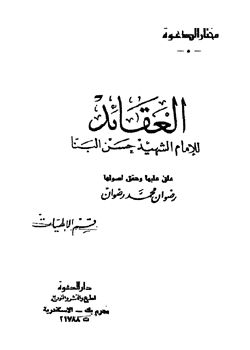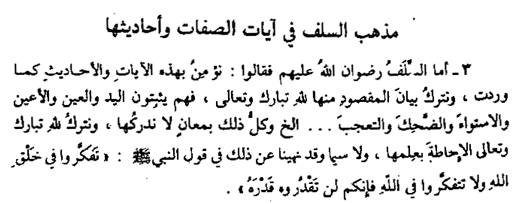
Saturday, January 16 2010 - by Admin
Read more articles at TheMadkhalis.Com
Comparing Hasan al-Banna with Ibn Hajar
Before proceeding to the content of this article it is necessary to address a shubhah (doubt) used by the Ikhwaaniyyah which is that Hasan al-Banna made the same mistakes as the likes of Ibn Hajar al-Asqalani and an-Nawawi. Whilst Ibn Hajar al-Asqalani and an-Nawawi were affected by the Tafweed and Ta'weel of the Ash'arites, they actually benefited the Ummah with true Sharee'ah knowledge, in the sciences of hadeeth, in their compilations of hadeeth, in their explanations of the books of hadeeth, in the arena of biographies of the Companions and the narrators and so on - and this is an immense service to the deen of Islaam itself, in addition to the Muslims in general. These true, genuine scholars, putting aside their errors in the field of the Attributes had a sound aqidah and were not known for flattery of and intimacy with the Raafidah, praising them and equating their deen with the deen of the Muslims.
 As for Hasan al-Banna then he too fell into Tafweed and claimed it was the way of the Salaf, but he does not compare to the Hadith giants Ibn Hajar and an-Nawawi, and his contribution to the Ummah was to innovate hizbiyyah in the deen of our Lord and spawn hundreds if not thousands of jamaa'aat and hizbiyyaat that would lead to the splitting of the hearts of the Muslims, and splitting of their ranks, each party rejoicing with that which is with it. Further, he destroyed and demolished the aqidah of al-walaa wal-baraa'. And he spoke with the Wahdat ul-Wujood of the Soofees (being a Hasafi Soofee himself), and he uttered statements of Major Shirk - ascribing the ability to forgive to the Messenger (alayhis salaam) - and flattery and praise of the enemies of Allaah, and enemies of Abu Bakr and Umar (radiallaahu anhum) and many more calamities. If you could picture Ibn Hajar al-Asqalani, you would see the appearance of the Sunnah on him, in his dress, his beard and so on, and when you look at Hasan al-Banna you see the trimmed, groomed European dressed in his suit and tie ... and what immediately comes to mind are the yolks of colonialism.
As for Hasan al-Banna then he too fell into Tafweed and claimed it was the way of the Salaf, but he does not compare to the Hadith giants Ibn Hajar and an-Nawawi, and his contribution to the Ummah was to innovate hizbiyyah in the deen of our Lord and spawn hundreds if not thousands of jamaa'aat and hizbiyyaat that would lead to the splitting of the hearts of the Muslims, and splitting of their ranks, each party rejoicing with that which is with it. Further, he destroyed and demolished the aqidah of al-walaa wal-baraa'. And he spoke with the Wahdat ul-Wujood of the Soofees (being a Hasafi Soofee himself), and he uttered statements of Major Shirk - ascribing the ability to forgive to the Messenger (alayhis salaam) - and flattery and praise of the enemies of Allaah, and enemies of Abu Bakr and Umar (radiallaahu anhum) and many more calamities. If you could picture Ibn Hajar al-Asqalani, you would see the appearance of the Sunnah on him, in his dress, his beard and so on, and when you look at Hasan al-Banna you see the trimmed, groomed European dressed in his suit and tie ... and what immediately comes to mind are the yolks of colonialism.
What is the Incentive or Motive for those Claiming Salafiyyah to Propagandize for Banna?
 To the right is the book "al-Aqaa'id" of Hasan al-Banna and it is one of the books that continues to be published and it is read and studied in abundance. He has section in there pertaining to the Sifaat in which he presents the madhhab of the Salaf as "Tafweed" and the madhhab of the Khalaf (later ones) as "Ta'weel", and then he uses as evidence the sayings of al-Ghazali (d. 505H) and Fakhr ud-Din ar-Razi (d. 606H) amongst others and he brings the usual shubuhaat in this regard.
To the right is the book "al-Aqaa'id" of Hasan al-Banna and it is one of the books that continues to be published and it is read and studied in abundance. He has section in there pertaining to the Sifaat in which he presents the madhhab of the Salaf as "Tafweed" and the madhhab of the Khalaf (later ones) as "Ta'weel", and then he uses as evidence the sayings of al-Ghazali (d. 505H) and Fakhr ud-Din ar-Razi (d. 606H) amongst others and he brings the usual shubuhaat in this regard.
Most are familiar with the position of al-Bannaa in this regard and he has been refuted on this subject, however the point here is not to repeat what is already known, since the issue here is not actually about al-Banna falling into Tafweed, but rather the issue here is a people who to this day, claiming Salafiyyah, propagandize for this man, drawing people towards him and to his books.
And these people cannot be doing this for any reason - even if they know of his Tafweed and tasawwuf and so on - except because they believe in his methodology and his fikr, or that there is something of value in the hizbiyyah and the various other secular methodologies he introduced into the deen of al-Islaam, making Tabdeel of the some of the Sharee'ah thereby (the Innovators are Mubaddiloon as explained by al-Qurtubee).
If this was not the case, then for what reason are they propagandizing for this Soofee, Ash'ari, Mufawwidh and rushing to defend this man (whilst claiming Salafiyyah and a Salafi aqidah), knowing that he disdained and belittled the affair of Major Shirk, flattered the enemies of Allaah, the Raafidah, and spent his life simply trying to gather every Jahmee, Rafidee, Mu'tazilee, Soofee and other innovators under his umbrella? So these are some important questions.
Hasan al-Banna and Tafweed
Though the section is quite long, we simply want to document his conclusions and corroborations on this subject.
Al-Banna wrote:

The salaf (early generations of Muslims), may Allah be pleased with them, said: "We believe in these verses and Ahaadeeth as they are, and we leave aside explanation of their meanings to Allah, the Blessed and Exalted". Thus, they affirm their belief that the words Allahıs hand, eye, eyes, settling Himself firmly on the Throne, laughter, wondering...etc, cannot be explained with meanings that we can understand, and therefore their explanation should be left only to Allah the Blessed and Exalted, who knows their true meaning. This is especially so in view of the prohibition by the Prophet, peace be upon him: "Ponder over the creation of Allah and do not speculate on the Essence of Allah, because you will never be able to give Him His due."
Later he writes:

I have already made clear to you that the first generations, may Allah be pleased with them, believed in the verses and Ahaadeeth mentioning the attributes of Allah as they came down to them and left the explanation of their intent (i.e. meanings) to Allah, the Blessed and Exalted, while believing purifying Allaah of having resemblance to any of His creatures.
In this section as a whole, Hasan al-Banna quotes frequently from al-Ghazali and also from Fakhr ud-Din ar-Razi's book called "Asaas ut-Taqdis" which is a book that contains the greatest of the doubts of the Jahmiyyah and their attacks against the deen of the Messengers. This book of ar-Razi is the one for which Shaykh ul-Islaam Ibn Taymiyyah wrote "Bayaan Talbees al-Jahmiyyah". To understand the nature of ar-Razi (d. 606H), this article here should help put things into context.
Shaykh ul-Islaam Ibn Taymiyyah on Tafweed
As for Tafweed itself then here are the words of Shaykh ul-Islaam Ibn Taymiyyah, abridged from Dar at-Ta'aarud (1/201-205):
وأيضا : فالخطاب الذي أريد به هدانا والبيان لنا وإخراجنا من الظلمات إلي النور إذا كان ما ذكر فيه من النصوص ظاهره باطل وكفر ولم يُرد منا أن نعرف لا ظاهره ولا باطنه ، أو أريد منا أن نعرف باطنه من غير بيان في الخطاب لذلك ، فعلي التقديرين لم نخاطَبْ بما بُيّن فيه الحق ، ولا عرفنا أن مدلول هذا الخطاب باطل وكفر .
وحقيقة قول هؤلاء في المخاطِب لنا : أنه لم يبين الحق ولا أوضحه مع أمره لنا أن نعتقده ، وأن ما خاطبنا به وأمرنا باتباعه والرد إليه لم يبين به الحق ولا كشفه ، بل دل ظاهره علي الكفر والباطل ، وأراد منا أن نفهم منه شيئا أو أن نفهم منه ما لا دليل عليه فيه ، وهذا كله مما يعلم بالاضطرار تنزيه الله ورسوله عنه ، وأنه من جنس أقوال أهل التحريف والإلحاد ...
As for at-tafweed: Then it is from what is known that Allaah the Exalted ordered us that we ponder over the Qur'an and he has encouraged us to understand and grasp it (with our intellects), so how can it be permissible - alongside that - that what is desired from us is to turn away from understanding it, knowing it and grasping it (with our intellects)?
And also, the address (i.e. of the Qur'an, Allaah's speech to us) by which our guidance, clarification for us, and removing us from the darknesses into the light, is intended, if the apparent (meaning) of what is mentioned therein of the texts is baatil (falsehood) kufr (disbelief), and it was not desired from us that we know its apparent (meaning) and nor its inner (meaning), or that it was desired from us that we know its inner (meaning) without there being any clarification in [Allaah's] address (i.e. speech) to us regarding that, then upon eitehr of these two considerations, we have not been addressed (by Allaah) by that with which the truth has been clarified, and nor have we come to know that the meaning (import) of this address (i.e. Allaah's speech to us, in the Qur'an) is falsehood and disbelief.
And the reality of the saying of those (people) regarding that which has been communicated to us is that it has not explained the truth and nor made it clear, despite being ordered by by it that we understand it, that what He addressed us with and ordered to follow and to return back to is not something by which the truth is explained and nor uncovered. [On the contrary], it's apparent (meaning) indicates disblief and falsehood. And He desired from us that we understand something from it, or that we understand from it that for which there is no evidence in it (to begin with). And all of this is from that which is known by necessity that Allaah and His Messenger should be purified and absolved of, and that this is from the generality of the type of sayings of the people of tahreef (distortion) and ilhaad (deviation.
Up until he said:
So it becomes clear that the saying of the people of Tafweed, those who claim that they are following the Sunnah and the Salaf, that is is from the most evil of the sayings of the people of innovation and deviance.
Again to make it clear, the point being made here is not that al-Banna spoke with Tafweed and so on, but it is to show, by way of documenting this fact from Hasan al-Banna - the intellectual fraud of a people claiming attachment to Sunnah and Salafiyyah, and then showing death-defying defences (difaa'un mustameet) in their actions to try and defend the likes of Hasan al-Banna. Whilst we raise the question of what exactly is it in the works of Hasan al-Banna for which you are sacrificing yourself in this manner? Where is the type of benefit we find in the works of Ibn Hajar and an-Nawawi in the works of Hasan al-Banna?
Now when we see these people claiming or manifesting defence of the Sunnah and defence of the aqidah and of "refuting the Ash'aris" and the likes - is it just an academic exercise? Iis it upon the deen of the Murji'ah of just holding pure facts and information in your heart regarding the creed without that producing the necessary emotions leading to a consistent, congruent policy of al-walaa and al-baraa for its sake?
Related Articles:
- Hasan al-Banna and Tafweed: The Most Evil of the Sayings of the People of Innovation and Deviance
//www.themadkhalis.com/md/?csmiy
 The salaf (early generations of Muslims), may Allah be pleased with them, said: "We believe in these verses and Ahaadeeth as they are, and we leave aside explanation of their meanings to Allah, the Blessed and Exalted". Thus, they affirm their belief that the words Allahıs hand, eye, eyes, settling Himself firmly on the Throne, laughter, wondering...etc, cannot be explained with meanings that we can understand, and therefore their explanation should be left only to Allah the Blessed and Exalted, who knows their true meaning. This is especially so in view of the prohibition by the Prophet, peace be upon him: "Ponder over the creation of Allah and do not speculate on the Essence of Allah, because you will never be able to give Him His due."
The salaf (early generations of Muslims), may Allah be pleased with them, said: "We believe in these verses and Ahaadeeth as they are, and we leave aside explanation of their meanings to Allah, the Blessed and Exalted". Thus, they affirm their belief that the words Allahıs hand, eye, eyes, settling Himself firmly on the Throne, laughter, wondering...etc, cannot be explained with meanings that we can understand, and therefore their explanation should be left only to Allah the Blessed and Exalted, who knows their true meaning. This is especially so in view of the prohibition by the Prophet, peace be upon him: "Ponder over the creation of Allah and do not speculate on the Essence of Allah, because you will never be able to give Him His due."